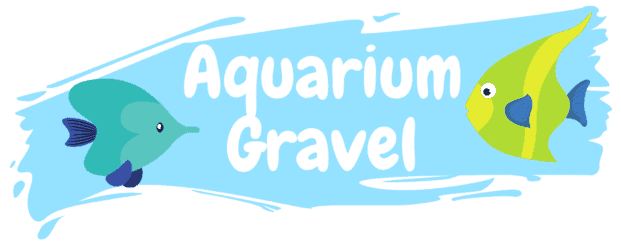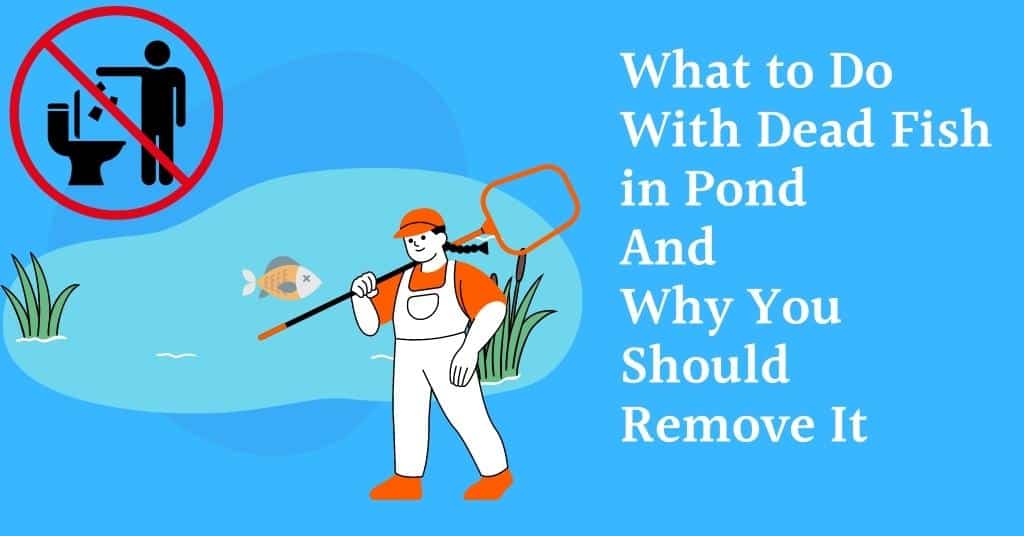Last Updated on November 29, 2021 by cmoarz
Dear pond owners, It always sucks when you take a nice look at your pond only to discover you’ve lost a fish or a few fish. It’s important to remove the dead fish from the pond so you don’t suffer more losses.
This article will explain what to do with dead fish in a pond, How to dispose of dead fish, Why you need to remove it as quickly as possible, And why it might have happened to cause the pond fish kills in the first place.

How to Dispose of a Dead Pond Fish Properly
Table of Contents
There are several ways to dispose of dead pond fish. The most common option people use is to bury the fish in a flower bed or garden to act as fertilizer.
This is likely considered the best way to dispose of dead fish.
Another common option is to have the fish placed in a vermicomposting bin. The worms will aid the decay process and allow the fish to be utilized as worm casting fertilizer in the future.
This option can carry some smell if your vermicomposting bin is close by to your house or a window. It’s not recommended for indoor composting heaps depending on how large the fish is.
You may wish to bury the fish into the wormy substrate to help contain the smell as well.
If you have a firepit, You may also burn the fish body and bypass the decay process altogether.
You should never eat a dead fish you’ve found in your pond. You should never feed the dead fish to another animal either. You can never be 100% sure why a fish has died.
If this fish was diseased or had a fungal infection or parasites, it could be detrimental to your animal’s health as well as yours. It could cause food poisoning or other illness. It could also introduce deadly parasites into you or the animal that’s eating its body.
If it’s a small fish, You should also not flush it down the toilet. You may throw it out into the garbage if it’s small enough, You may not wish to do that with a larger fish.

Why You Need To Remove Dead Dish Quickly
An untreated pond fish death can end in disaster for the rest of the pond if it’s not dealt with immediately.
A lot of things can kill a common pond fish, But the end result is always the same. If not removed from the water immediately, the pond will suffer from massive swings of water quality issues.
Once a fish dies, Its body immediately starts to decay. This releases all sorts of bad substances into the water and can cause a massive ammonia spike which will kill everything else in the pond.
In an open system, Nature has its own way of dealing with dead bodies, But in the closed nature of a human-created pond, those mechanisms usually don’t exist.
Our ponds are a carefully and delicately balanced ecosystem that can be destroyed very easily if we aren’t careful. A dead fish is one of those things that will derail everything.
A decaying fish kill may also cause a large algae bloom that could remove all oxygen and light from the pond and kill the fish populations within it, including plants and anything else.
Decay aside, if the pond fish’s death was attributed to sickness or disease, It could easily spread to other fish, amphibians, and animals that live in or enter the pond (including birds!).
The last thing you want is for a pond fish disease to spread to the rest.
Having dead fish in a pond will also attract pests and predators to your pond which could put you, your family, and your pets and fish in danger.
These are just some of the important reasons why you need to remove a dead fish at bottom of pond or a dead fish float as soon as you notice it. Waiting too long can end in a disaster which we’ve seen time and time again.

How to Remove Dead Fish From Pond
While dealing with pond fish death is sad, It’s important to remember what we need to do in order to avoid any future issues.
Knowing how to remove a dead fish from a pond might seem intuitive for some, But actually, the variety in pond size, depth, and how the fish died can be a huge factor in how to remove it.
In general, you have 2 types of dead fish in your pond. Floaters, and sinkers. Floaters are the easiest to deal with, and depending on large your pond is, You can simply use a long-handled net or take a small boat to grab it.
The reason fish float when they die is because bacteria start breaking down and producing gases inside the fish’s body. This can take a bit of time.
Unfortunately, fish will usually sink before they float and not all dead fish float all the time.
Sometimes they sink to the bottom of the pond which makes retrieval more difficult, especially considering you may not even be aware they are there in the first place. Especially if they get stuck at the bottom.
Knowing is half the battle, Luckily in smaller ponds, it’s pretty obvious and you can see them. Deeper larger ponds can pose more of an issue.
You might never know if a fish has died in very deep ponds when it’s sunken to the bottom. Usually in this case the pond is large enough to break down the ammonia and other substances released during decay without causing harm to the pond itself.
However, if you are lucky enough to be aware of the fish, Or have seen it, You should remove it regardless.
To do that, it’s the same as scooping a fish off the surface using a long-handled net. You may need a small boat such as a canoe or a raft tied off to the shoreline depending on how large the pond is.
Check out one of these long-handled fishnets here.
You might have problems locating the fish, luckily most fish skin is silver or reflects light very well. This will help you locate it by using a flashlight and different angles to achieve a reflection of the skin.
Consider using a transparent plastic box at the surface of the water to get a better view of the bottom of the pond to spot it that way.
Once you’ve determined the location of the fish kill, Removing it is as easy as scooping it out.

What Causes Fish to Die in a Pond
Pond fish can die for many reasons. A fish kill isn’t a rare occurrence. Check out our article on why your pond fish keep dying for more in-depth information on what causes fish kills.
Winter fish kills are quite common. A weaker fish may not survive overwintering. The winter could have been colder than usual and the pond wasn’t sufficiently deep enough to cope with the ice layer above.
Or it froze completely. Even in winter fish need oxygen and is usually given to them via a winter fish oxygen hole.
These holes are usually maintained by a low-cost pond heater, such as a K&H thermo-pond perfect climate deluxe pond de-icer or farm innovators floating pond de-icer.
Check out our recommendation here.
Without a way to give fish oxygen during the winter, winter fish kills can and do happen.
Speaking of oxygen, lack of oxygen is the most common cause of common pond fish kills.
Winter aside, Summer also poses its own issues for oxygenation. Water temperature fluctuations, algae blooms, and lack of current agitation can all lead to low oxygenation levels in the pond.
Unfortunately, that’s only the tip of the iceberg for reasons why your fish may have perished. Remember to check our article here for more information and reasons it could have happened and way’s to prevent it from happening again!

Dead Fish in Pond After Rain?
This problem is most notable in koi and goldfish bonds where perfect water parameters are delicate and easy to unbalance.
One might assume the surface water turbulence caused by the rain could only be a good thing for oxygenating the pond. While that’s true, There’s another issue at play here.
Whether it be a small rainstorm, heavy rains, or simple afternoon snow showers, all of these can easily throw off the delicate balance of your pond and cause water quality issues that can kill very quickly.
All this extra water can dramatically alter the water chemistry of your pond. Water chemistry that your very delicate koi or goldfish rely on to survive.
Rainfall is usually high in nutrients since the water cycle is natural. Most water will flow through soil, plants, animals that ingest it, and the atmosphere during the cycle.
Because of this, rainwater usually includes salt, phosphorus, calcium, magnesium, nitrogen, and potassium. Any pollutants that may be found in the soil or atmosphere are also present in rainwater.
There are also a lot of other considerations, such as runoff from the shoreline, rain that physically injured the fish (think hail, etc), Temperature fluctuations, as well as simply just causing undue fish stress.
If it’s a particularly hot day rain, it could also easily cause low oxygen levels. Funny how that works eh? Oxygen depletion is obviously not ideal, but easy workarounds exist to prevent that issue.
About
Owner of AquariumGravel.com and also owner of actual Aquarium Gravel believe it or not! ;). Setting up beautiful aquarium sceneries and habitats since I was very young. Enjoy!
- Web |
- More Posts(290)

